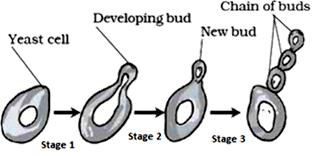CBSE Class 10th Exam 2022-23 : Science (Biology) Practical-Based Questions with Solution
CBSE Class 10 Science Exam 2022-23 will have questions based on Practicals in the form of MCQs. CBSE Class 10 Science Question on Practical-Based given in this article can be very helpful in understanding the new format of questions.
GENERAL INSTRUCTIONS:
(i) Questions 1 to 15 are of 1 mark and comprise of multiple-choice questions.
(ii) Questions 16 to 20 are of 2 marks and comprise of short answer questions.
1. The diagram given below is the experimental set-up to show that carbon dioxide is given out during respiration In this set-up what does the test tube marked (X) contain?
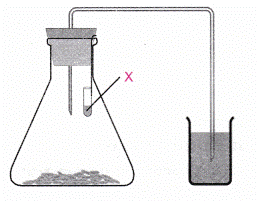
(a) Water
(b) Lime water
(c) Potassium hydroxide
(d) Hydrochloric acid
Answer. (c) Potassium hydroxide
2. The seeds used in experiment to show that carbon dioxide is given out during respiration are:
(a) dry seeds
(b) boiled seeds
(c) crushed seeds
(d) germinating seeds
Answer. (d) germinating seeds
3. In the experimental set-up, KOH solution has been kept in the flask to:
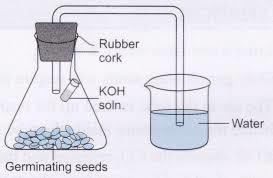
(a) react with water to generate oxygen.
(b) create a dry atmosphere for wet germinating seeds.
(c) absorb carbon dioxide so as to create a partial vacuum.
(d) remove impurities present in the air in the flask.
Answer. (c) absorb carbon dioxide so as to create a partial vacuum
4. Out of the four experimental set-ups shown below, which one will demonstrate the evolution of carbon dioxide during respiration of germinating seeds:
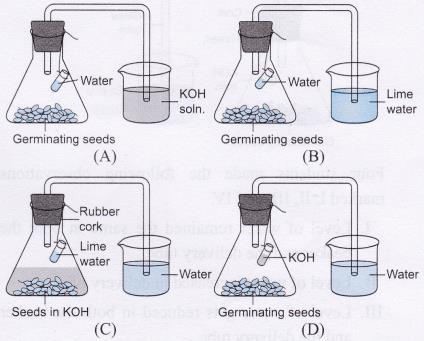
(a) A
(b) B
(c) C
(d) D
Answer. (d) diagram D is correct because KOH is taken in small test tube
5. The type of respiration shown by the germinating seeds to release carbon dioxide is:
(a) Anaerobic respiration
(b) Aerobic respiration
(c) oxidative phosphorylation
(d) Incomplete oxidation
Answer. (b) Its aerobic respiration takes oxygen and releases carbon dioxide
6. In an airtight experimental set-up which was used by you in the laboratory to study respiration in germinating seeds, the seeds obtained the oxygen for respiration from:
(a) air in the flask
(b) water in the beaker
(c) water in the germinating seeds
(d) water used for soaking the seed
Answer. (a) air in the flask
7. Which of the following substance is used to make all connections air tight in the experiment to show that carbon dioxide is produced during respiration:
(a) oil
(b) Vaseline
(c) ghee
(d) wax
Answer. (b) Vaseline
8. Name the cell components required for completion of aerobic respiration in a cell.
(a) Chloroplast and nucleus
(b) Ribosomes and ER
(c) Golgi body and lysosomes
(d) Cytoplasm and mitochondria
Answer. (d) Cytoplasm and mitochondria
9. Mention the sequence of budding in hydra:

Correct sequence is
(a) A, B, C, D
(b) A, D, B, C
(c) C, A, B, D
(d) D, A, B, C
Answer. (a) A, B, C, D
10. Which of the following is not a feature of asexual reproduction?
(a) Two individuals of different sexes involved.
(b) No meiosis occurs.
(c) New individuals are genetically identical to the parents.
(d) Offsprings are clones of parents.
Answer. (a) Two individuals of different sexes involved.
11. Out of the following diagrams which one depicts a stage in binary fission of Amoeba?

(a) A
(b) B
(c) C
(d) D
Answer. (d) D
12. The following figures illustrate binary fission in Amoeba in an incorrect sequence.
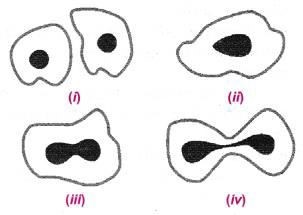
The correct sequence is:
(a) (i), (iii), (iv), (ii)
(b) (ii), (iii), (iv), (i)
(c) (iv), (iii), (ii), (i)
(d) (iii), (iv), (ii), (i)
Answer. (b) (ii), (iii), (iv), (i)
13. What do F and E represent in the given diagram?
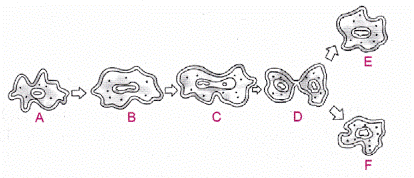
(a) Parent yeast cells
(b) Daughter Amoebae
(c) Yeast buds
(d) Parent Amoebae
Answer. (b) Daughter Amoebae
14. Two of the following four figures that illustrates budding are:
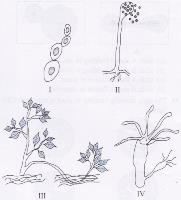
(a) I & II
(b) I & III
(c) I & IV
(d) II & IV
Answer. (c) I & IV
15. A chain of yeast cells are formed because:
(a) yeast cells do not separate after budding*
(b) daughter cells are unable to survive without parent cells
(c) buds reproduce as soon as they are formed
(d) daughter cells stick together with the help of mucus
Answer. (a) yeast cells do not separate after budding
16. After observing the prepared slides of binary fission in Amoeba and budding in yeast, the following observations were reported:
(a) Single cells of Amoeba and Yeast were undergoing binary fission and budding respective
(b) Cytokinesis was observed in the Yeast cell.
(c) Elongated nucleus was dividing to form two daughter nuclei in Amoeba.
(d) A chain of buds were observed due to reproduction in Amoeba.
The correct observation(s) is/are:
(a) d, a and c
(b) c and d
(c) b only
(d) a and c
Answer. (d) a and c
The correct observations are: i. Single cells of Amoeba and Yeast were undergoing binary fission and budding respectively. ii. Elongated nucleus was dividing to form two daughter nuclei in Amoeba.
17. The following are the sketches of budding in yeast made by some students:

(i) Which of the sketch is not illustrative of budding in yeast is :
(a) I
(b) II
(c) III
(d) IV
(ii) Write the possible reason?
Answer. (i) (c) III
(ii) Figure ‘C’ shows complete individual yeast cell not budding.
18. The figures given are drawn from slides showing reproduction in yeast and Amoeba. What correct description can be given to these figures?
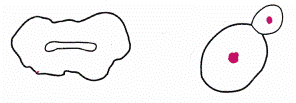
Answer. (a) Amoeba undergoing binary fission is at a stage when nucleus is elongating, while yeast has undergone budding.
19. A student is to conduct an experiment to show CO2 is released during respiration. List two precautions that he/she must take for obtaining correct observation.
Answer. Two precautions to be taken are:
(i) Germinating seeds (living) should be used.
(ii) The experiment set up must be air-tight.
20. Students were asked to observe the permanent slides showing different stages of budding in yeast under high power of a microscope.
(a) Which adjustment screw (coarse/fine) were you asked to move to focus the slides?
(b) Draw three diagrams in correct sequence showing budding in yeast.
Answer. (a) A fine screw is used to focus the slides of budding in yeast under high power of a microscope.
(b) Sequence showing budding in yeast:
